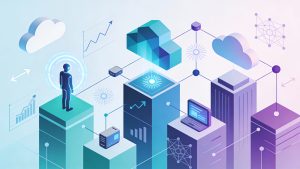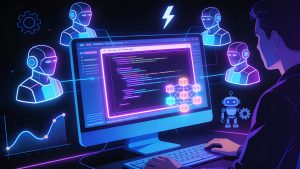Artificial intelligence continues to push boundaries across the IT industry, with software development experiencing some of the most significant transformations. What once relied heavily on human effort for every line of code is now being streamlined by advanced AI coding assistants and generative AI models. The impact has brought greater efficiency, faster testing, and higher-quality code checks — but human expertise remains the cornerstone of ensuring reliability and innovation.
The Growing Adoption of AI in Coding
Technological leaders have confirmed just how deeply AI is being embedded into modern software ecosystems. In some organizations, up to 30% of repositories already include AI-generated code. At the same time, global surveys indicate a dramatic rise in AI adoption among developers, with usage climbing from under 50% to well over 60% in just a year.
Industry experts note that this shift is not about diminishing developer roles, but about extending their productivity and enabling them to focus on creative, high-value innovation. Instead of replacing skilled professionals, AI tools function as accelerators, helping teams tackle backlogs, automate repetitive checks, and streamline delivery cycles.
AI’s Benefits for Developers
Developers often face immense pressure to deliver faster while maintaining high standards of performance, security, and stability. AI coding support directly addresses these challenges by automating routine workflows, generating reliable summaries of functions, and reducing the burden of debugging.
Organizations adopting AI-assisted development highlight clear benefits:
- Increased productivity: Studies show more than 80% of developers report efficiency gains when using AI tools.
- Fewer repetitive tasks: High-frequency bugs and manual checks can be managed or solved by AI, allowing developers to prioritize innovation.
- Enhanced quality: AI systems can assist with cleaner code reviews, stronger testing coverage, and faster identification of potential issues.
For example, major firms have integrated AI to reduce manual toil, save hours on routine checks, and significantly improve code standards. Teams benefit from AI-generated insights that make code easier to understand, ultimately boosting developer confidence and collaboration.
Balancing Trust and Skepticism
Despite rapid adoption, uncertainty remains. Many developers question whether AI-generated code can be fully trusted. While automation handles quantity well, accuracy and security are recurring concerns. Surveys reveal that almost half of professionals hesitate to rely fully on AI outputs without human verification.
This sentiment underscores an essential fact: developers are required more than ever to act as reviewers and guardians of quality. AI may streamline features and speed up documentation, but it cannot yet match human judgment in ensuring compliance with industry-specific standards, security best practices, or ethical concerns.
The Expanding Role of AI in Testing
One of AI’s most transformative contributions is in the field of testing. Traditional testing is time-intensive and often limited in scope, making complete coverage nearly impossible. AI introduces automation that broadens coverage and reduces resource dependency.
Developers are now experiencing:
- Comprehensive test automation: AI-powered systems expand validation, allowing teams to catch issues earlier.
- Clearer problem explanations: Generative AI can not only identify errors but also explain them for faster resolution.
- Agentic assistance: In some cases, AI agents can automatically repair or optimize functions without manual intervention.
However, research into AI deployment shows mixed results. While AI improves certain aspects of speed and efficiency, some studies indicate that developers may spend more time overriding or rewriting AI suggestions when outputs are imprecise. Businesses, therefore, need to evaluate the balance between automation and human oversight in their workflows.
Beyond Developers: AI Across the Product Lifecycle
AI is no longer reserved for software engineering teams. Its role is expanding across the entire product development lifecycle. From design and prototyping to platform testing, AI-driven workflows are strengthening cross-functional collaboration.
Digital leadership reports highlight a growing demand for AI-skilled professionals, signaling that AI competencies may soon outweigh years of conventional development experience. Leaders recognize that professionals capable of navigating AI integration bring greater long-term value to organizations.
Experts further emphasize that AI’s real strength lies in augmenting human effort across every discipline, ensuring that design, testing, support, and innovation progress together at greater speed and accuracy.
The Human Element Remains Essential
Regardless of its progress, AI is not yet a substitute for skilled engineering. Human oversight continues to be indispensable for several reasons:
- Oversight of AI accuracy: Developers must validate and correct potential flaws or biases in AI-generated code.
- Quality reinforcement: Engineers provide the creative logic and holistic awareness that AI cannot replicate.
- Security and accountability: Developers act as final owners of code, ensuring applications remain secure and maintainable.
Industry leaders consistently reinforce one message: AI can ease workloads, but it cannot replace the responsibility and critical thinking brought by developers.
The Future of Software Development with AI
AI coding in 2025 represents a pivotal moment in the IT industry. Tools are drastically improving productivity, automating painstaking tasks, and supporting extensive testing — but they are not removing the need for developers. Instead, they are enhancing developer effectiveness by allowing professionals to focus more on creative problem-solving, architectural design, and innovation.
The integration of AI in software development signifies a partnership rather than a handover of responsibility. The most successful organizations will be those that embrace AI as an enabler, but maintain rigorous human oversight to ensure security, ethical compliance, and accountability.
The developers of tomorrow are not being replaced — they are being elevated.
Read more such articles from our Newsletter here.



